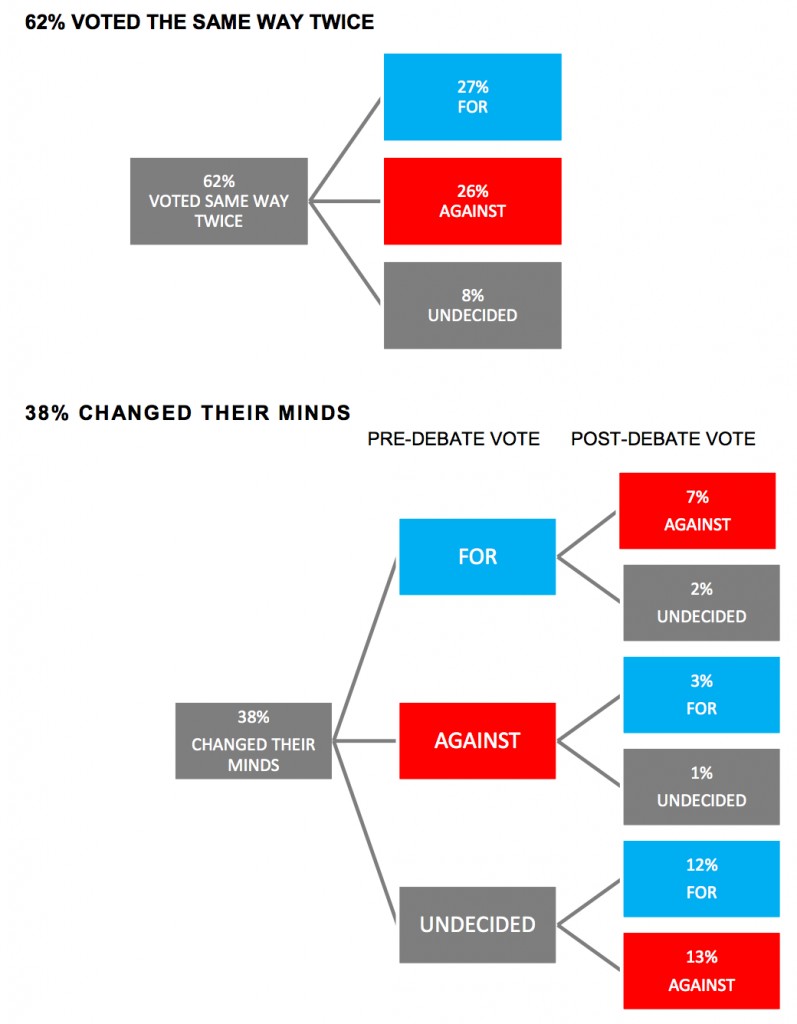Video from Wednesday’s debate over “Death Is Not Final” is now up.
You’ll be happy to hear that the good guys “won.” In scare quotes because helping the world’s population understand that naturalism is the right way to view the universe is a long-term project that won’t be settled with a single debate. But Intelligence Squared does a fun thing where they ask people to vote before the debate starts, and then again afterward. We started out the night slightly behind in the polls, and by the time we were done we were slightly ahead. Mostly by peeling away the undecideds, as any savvy politician strives to do. [Update: oops, not right. See below.] So that counts as a victory — especially when the topic is one where many people (not all!) have fairly fixed opinions.
It was a pleasure to have Steve Novella as a partner. The man knows his neuroscience, as well as his debating. He did a great job making the single most important point for an issue like this: the mind is the brain, full stop. It’s hard to hear the case he makes and hold on to any contrary view.
I was slightly disappointed in the folks on the other side. Eben Alexander basically relied on two things. One was his personal story of having a Near-Death Experience while in a coma. Anyone who accepts that people can experience dreams or hallucinations will not be overly persuaded by that alone. The other was to throw up ideas like “quantum mechanics” and “the hard problem of consciousness” in an obfuscatory way, to give people license to believe that science doesn’t understand everything. Which is true! Science doesn’t understand everything. Which doesn’t change the fact that no serious researcher in quantum mechanics or the hard problem thinks that those ideas provide an excuse for believing in life after death.
Ray Moody was a very pleasant gentleman, someone you’d be happy to have a beer with and talk philosophy. But he did almost nothing to defend the proposition. I was expecting him to broaden the evidence from Alexander’s own case to many others, but instead he spoke in generalities about science and philosophy and logic, concluding essentially that it’s “conceivable” that a realm exists where souls can persist after death. Indeed it is. Many things are conceivable.
At the end of my opening talk I said that the choice here basically comes down to two options we can believe:
- Everything we think we understand about the behavior of matter and energy is wrong, in a way that has somehow escaped notice in every experiment ever done in the history of science. Instead, there are unknown mechanisms allow information in the brain to survive in the form of a blob of spirit energy, which can then go start talking to other blobs of spirit energy, but only after death, except sometimes even before death.
- Physics is right. And people under stress sometimes have experiences that seem real but aren’t.
In the light of the evidence, the choice is pretty clear. We’ll get there, a couple of percentage points at a time.
Update: I was too hasty in presuming that most of our increase came from swaying undecided voters. Here are the actual data:
As you can see, the undecideds actually broke almost equally for the two sides. Our glorious victory actually came from a combination of factors, including persuading some of the “For” voters to switch.



Best quote of the debate:
“Quantum mechanics is confusing and consciousness is confusing, so maybe they’re the same.” –Scott Aronson
That didn’t even take all fifteen seconds! Brilliant!
Very nice debate, but I have a question: how do you prepare for an event like this? In real life when you apply for a job and go to an interview you prepare for it: research the company, anticipate questions, etc.
In an important debate where you sell a point of view to a live audience, how do you prepare for it? What do you actually do?
Kashyap: Thanks for your comment!
The Comments on this blog are just like those on most similar blogs. Any comments raising doubts about a militantly atheist point of view are derided. This is usually on the grounds of scientific logic – but when you start to poke at the scientific bit, it turns out that there is very little scientific knowledge, even of the rudimentary kind I have. On another blog, I talked about the consequences of Relativity on what time is and also of some of the bizarre things arising from quantum theory. All pretty routine stuff – the sort of things that someone interested in the subject will easily find out from any one of hundreds of books. All the Commenters on the blog thought I was crazy! In fact, they were absolutely convinced that the Universe is basically just a mechanism like a clock. Fine, if they were living in 1850 – but since then things have got a lot more mysterious!
@Ben Goren
I take it that you and six other people never heard of the problem of general relativity breaking down close to the moment of the big bang. If there was a singularity close to the moment of the big bang then it could have different laws of physics, if you take a number of Ph.D.’s word for it (don’t ask me how exactly). Then if there was a singularity and alternate universes branched off from that singularity, then there would be alternate universes with different laws of physics. Then again, inflation doesn’t predict a singularity, and it has a lot of success since people thought about the big bang this way. Yes, I know, you people don’t like jokes…
@Robert @kashyup
I sympathize with both of you, this like and dislike is ridicules. However I always read those comments that are disliked the most. They seem to make the most sense.
P.S. Spock had a beard in some episodes of TNG as the old Spock that had traveled back in time from the future. Then that was an alternate universe than in the new movie, because in the original Star Trek universe planet Vulcan was never destroyed.
Why do you stop women from posting on your blog? It makes no sense to stop a woman from trying to help out and get some questions answered by stopping her from posting. You should be ashamed of yourself for pretending to be something you just aren’t…
@…
It could have been worse. He could have wrote an entire book about how your views of a new way of looking at the behavior of light and electrons is wrong, just to conclude that the Yang-Mills Theory still doesn’t work out when it comes to the new discovery of the Higgs Boson, and light does not come from a charged particle in this case so there is another particle that doesn’t have any influence on anything else mathematically. On another note, I never had to input my sex before posting, and your sex really shouldn’t have anything to do with anything about science.
It´s very disappointing that no-one has answered my plea for a plausible-sounding explanation for the existence of the Universe by suggesting it probably came into existence as the result of a fluctuation. Very handy these fluctuation things. Particles popping into existence all the time and all over the place for no reason. Elephants in the shower stall and universes all suddenly materialising – here now, gone a fraction of a second later. All presumably obeying the laws of physics, which came from – I´ve forgotten where, but must have been another fluctuation. The original fluctuation that brought the Universe into existence was, of course, a good one. It didn´t even have anywhere to fluctuate! There was no space yet.
It seems there must be some laws of physics that exist eternally, even without a universe to exist in. They exist because of their own inherent logic, a logic which establishes all kinds of weird ways for the Universe to operate in, ways which frankly scientists don´t understand. At least, not today.
Robert: saying “a quantum fluctuation did it” is no better than saying “God did it”. In fact it’s worse, because it ignores time dilation, and it’s coming from a guy who is allegedly rational offering a scientific explanation. Only it’s no explanation at all. It’s “turtles all the way down”. The truth is we don’t know what did it. But there have always been people who put themselves up as a high priest of religion or cosmology, and tell you they do.
John D: I think we actually agree – no-one has even a glimmering of a rational explanation for our being here, together with the rest of the Universe. Given the nature of this blog and its contributors, my modest comments have been directed at the false certainties offered up by scientists. Religion is, of course, as bad or worse. I find the rubbish associated with organised religion absurd. Even if God exists, would he be in favour of people going to strange buildings to listen to men (usually) dressed in funny outfits, chanting and raving and, sometimes, waving things in the air that let off strange scents? Spouting odd certainties about the nature of GodWhy? What would be the point?
I think, though, that it´s possible to accept the possibility that the Universe was brought into existence deliberately and consciously by something outside of itself. Just not God, with all the paraphernalia attending religion. Sounds improbable, I agree – but then whatever the answer is must seem improbable at the moment. I expect 16th century man would have found it improbable that the solid oak desk he´s leaning his elbows on is actually 99% empty space.
It’s important to note that the issue of “shared-death experiences” was not answered by the “against the motion” side.
Also the “online voting” results are up on the Intelligence Squared site…68% for the motion “Death is not final” with 32% against.
My comments were directed at Sean not @kashyap Vasavada.
Robert: the word universe is derived from uni as in “one” and versa as in “vice versa”. It means “turned into one”. It means everything. And I do not accept the possibility that everything was brought into existence by some other thing. Because that’s turtles all the way down too.
“Physics is right.” Whose physics is right?
Idea 1: Milgrom’s acceleration law contradicts Newton-Einstein gravitational theory; therefore, Milgrom’s acceleration law is wrong.
Idea 2: Newton-Einstein gravitational theory contradicts Milgrom’s acceleration law; therefore, Newton-Einstein gravitational theory is (slightly) wrong.
According to Kroupa, Idea 1 is false and Idea 2 is true.
I have suggested that Milgrom is the Kepler of contemporary cosmology. It is possible that I am wrong about Milgrom? I don’t think so. If Milgrom’s acceleration law were wrong, then there would be no way whatsoever that Milgrom could have convinced McGaugh and Kroupa.
the dark matter crisis
John D : The trouble for me is that I find all the various suggestions for how the Universe came to exist “impossible”. Impossible that there exists, or existed, some entity that deliberately and consciously brought it into existence – but equally, and perhaps more, impossible that it sprang into existence from a total nothingness all on its own and for no reason, which would seem very like my elephant in the shower stall idea. I don´t think that supposing it to have existed for ever in some form or other would help much either.
If it were to be the case that it was brought into existence (deliberately and consciously) by something and we were going to be a bit pedantic about it, then we would have to find it another name.
When you have excluded the impossible, whatever remains, however improbable, must be the truth.
@Robert: Your questions are certainly interesting, but science using scientific method as defined today cannot answer these questions. As you know, in scientific method, one makes up models (no matter how bizarre they appear intuitively) and checks if they agree with experiments. Modern physics has been tremendously successful in explaining the data with models which are *irrational and illogical* from the point of view of everyday life. I can say that confidently as a (retired) physics professor. When they claim that universe came from nothing, that nothing does not mean absence of anything. It had quantum fields in it. Where did they come from? No answer! A good debater, of course, does not show his weak points to the opponents!! I have expressed my views (admittedly biased) about science and religion in a guest blog on another physics blog. I cannot give a link. But if you are interested, you can google for * Hinduism for Physicists*. Comments there or here are most welcome.
Pingback: The Uncertainty Blog gets its 15 minutes… | Uncertainty Blog
Would an artificial intelligence equal to or greater than our own worry about this issue, given that they could be instantly resurrected at the flip of a switch? Doubt it. Why not?
@david MOND/Milgrom I’ll make an appeal to authority. From Sean Carroll/Discover Magazine/2011. ” among its other shortcomings, MOND is not completely well-defined, so there’s a surprising amount of wriggle room available in fitting a variety of different observations. But to the vast majority of cosmologists, we have long since passed the point where MOND should be given up as a fundamental replacement for dark matter — it was a good idea that didn’t work.”
It seems to me that hallucinations and NDEs due to an impaired or decaying brain function would result in fuzzy descriptions of supposed events rather than the fantastically crisp and lucent events described by Dr. Eban. If Eban hallucinated his experiences then he certainly embellished them to a high degree post-hoc. To me this leaves just two choices: either his experiences were real or he is one of the slimiest liars on the face of the planet – take yer pick.
David Greene.
Actually many experiences of NDE and various drugs have a “more real than reality” aspect to them. So I am not sure he is embellishing even if he is misinterpreting.
See my post:
http://broadspeculations.com/2013/04/13/lets-explore/
Thanks for the comment James. By the way, your blog looks quite interesting and I will be visiting it from time to time 🙂
kashyap Vasavada: The public at large believes science is close to answering all the interesting questions, but – of course – it isn´t and probably never will be. Paul Davies commented that science has spent and continues to spend too much of its time studying the “How” of things and not nearly enough the “Why”. Brian Greene in a book of his I read recently says that when yet another “counter-intuitive” (ie apparently impossible) finding is made, the scientific attitude is: Just get your head down (ie don´t ask awkward questions) – and do the maths. I emailed a couple of well-known physicists a few years ago with a list of things that I didn´t understand – those things where you say “OK, that´s the way things are – but how can they possibly be that way?!” Surprisingly, they both answered and both said: No-one understands these things.